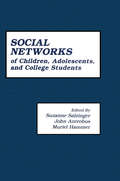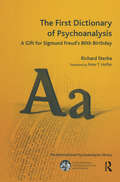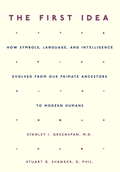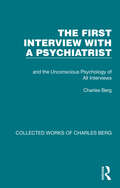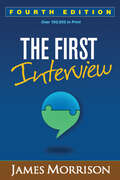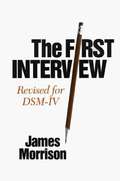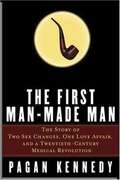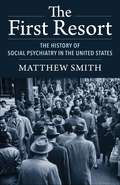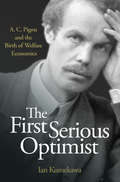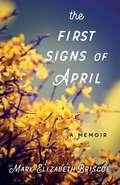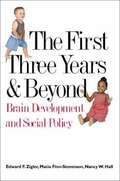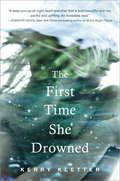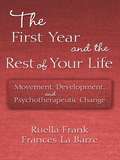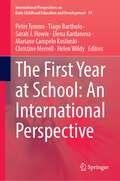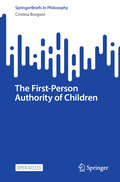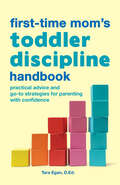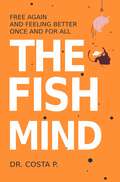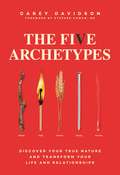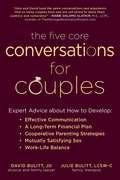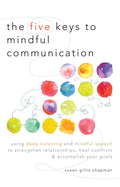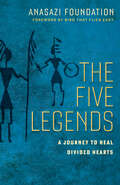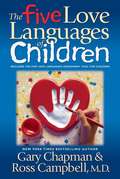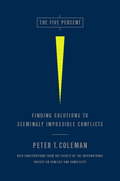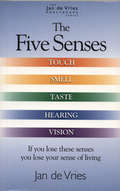- Table View
- List View
The First Compendium of Social Network Research Focusing on Children and Young Adult: Social Networks of Children, Adolescents, and College Students
by Suzanne Salzinger John Antrobus Muriel HammerResearch on adult personal-social networks has contributed greatly to an understanding of mental health, illness, and responses to stress. Fueled by this successful research and a growing concern for today's youth, the contributors to this volume have conducted investigations into the functioning and structures of the social networks of toddlers, school-age children, adolescents, and college students. The editors of this volume move beyond vague generalizations about characteristic and behavior acquisition through socialization in childhood by applying a longitudinal perspective to the sampling of child, adolescent, and young-adult network research. Social Networks of Children, Adolescents, and College Students unites several major empirical studies of children's social networks, investigating the acquisition of specific behaviors from particular groups of individuals under certain conditions. Topics covered include: * the effects of social networks on child development and disorder * the relationship between social networks and coping with stress the role of friends or groups in positive socialization * Of special interest to practitioners, researchers, and advanced students are: * comparative data on children from other cultural groups and non-mainstream American youths descriptions and evaluations of methodologies * introductory materials by the editors commenting on the field and the research extensive bibliographies
The First Dictionary of Psychoanalysis: A Gift for Sigmund Freud's 80th Birthday (The\international Psychoanalytical Association International Psychoanalysis Library)
by Richard SterbaThis is a new translation of the classic 1932 Dictionary by the author, for which Freud wrote a Preface praising the "precision and correctness" of the author's work and calling it a "fine achievement". The dictionary is not only an important source of information about psychoanalysis in Vienna in the 1930s but is also an insight into its author, as movingly attested by the 'Epilogue' to this edition written by his daughter Verena Sterba Michels, son-in-law Robert Michels, and grand-daughter Katherine J. Michels. This new edition also includes a transcript of an interview with the author by Dr William Langford, Chairman of the Department of Child Psychiatry at the Columbia College of Physicians and Surgeons.
The First Idea: How Symbols, Language, and Intelligence Evolved from our Primate Ancestors to Modern Humans
by Stanley I. Greenspan Stuart G. ShankerIn the childhood of every human being and at the dawn of human history there is an amazing and, until now, unexplained leap from simple genetically programmed behavior to language, symbolic thinking, and culture. In The First Idea, Stanley Greenspan and Stuart Shanker explore this missing link and offer brilliant new insights into two longstanding questions: how human beings first create symbols and how these abilities evolved and were transmitted across generations over millions of years. From fascinating research into the intelligence of both human infants and apes, they identify certain cultural practices that are vitally important if we are to have stable and reflective future societies.
The First Interview with a Psychiatrist: and the Unconscious Psychology of All Interviews (Collected Works of Charles Berg)
by Charles BergOriginally published in 1955, the blurb read: 'Again in this book the author expounds his main thesis – perhaps the main thesis of all modern psychiatry – namely that our conscious pre-occupations, thoughts and behaviour are merely the products or "symptoms" of a process that is going on within us (basically a physiological process) of which we are totally unconscious. Although we are at pains to conceal from ourselves and others, and even vehemently to deny, the nature and the very existence of this fundamental unconscious process, it is nevertheless the determinant of all that is us, biologically, psychologically and sociologically. In the author’s own words: "It is the force behind all activity, all life. It exists unseen in the most apparently superficial human relationship, even in the interview – as this book will show. It alone can give us the meaning of what we do and feel." The theoretical section of the book deals with the interviewer and the unconscious forces which determine the effects and the therapeutic results of the interview. The longer practical section demonstrates, by abundant examples from clinical material and by complete documentaries of actual psychiatric interviews, that it is unconscious forces which determine the patient’s symptomatic picture, his behaviour, his attitude to life, and above all his emotional relationship to the psychiatrist – and indeed to everyone he meets in every personal contact. The elucidation of this process should be of the utmost interest and of the utmost practical value to each of us in our every contact, superficial or deep, with every human being whom we meet in the course of our lives. The book will appeal to a wide public. Although it demonstrates the deepest and most worthwhile aspect of modern psychology and psychiatry, it avoids technical jargon and is written in a cheerful, lively and lucid style, easily assimilable by everybody.' Today it can be read and enjoyed in its historical context. This book is a re-issue originally published in 1955. The language used is a reflection of its era and no offence is meant by the Publishers to any reader by this re-publication.
The First Interview, Fourth Edition
by James MorrisonThis trusted practitioner resource and course text is grounded in James Morrison's experience with more than 15,000 mental health patients. Morrison provides a complete framework for interviewing adult patients about their current symptoms, personal and family history, mental status, behavioral risks, and other relevant issues. He offers guidance for selecting the best strategy for any clinical situation, building rapport, overcoming common challenges, and communicating findings. Appendices include a detailed semistructured interview and a self-assessment tool for interviewers, both with permission to photocopy. Purchasers also get access to a Web page where they can download and print the reproducible materials in a convenient 8 1/2" x 11" size. New to This Edition *Revised throughout for DSM-5. *Updated resources and suggested readings.
The First Interview: Revised for DSM-IV
by James MorrisonDesigned for students in all mental health disciplines and for professionals who wish to hone their skills, this user-friendly, jargon-free text clearly shows how to conduct a successful diagnostic interview. The book covers a broad range of personalities and problems, offering fresh insight on how to elicit key information from even the most challenging patient. Focusing on both content and process, it details what should be asked and describes the best methods for posing clinical questions. Many illustrative clinical vignettes enliven the presentation throughout. Appendixes feature a sample interview and written report, abbreviated DSM-IV diagnoses for easy reference, and more.
The First Man-Made Man: The Story of Two Sex Changes, One Love Affair, and a Twentieth-Century Medical Revolution, First Edition
by Pagan KennedyIn the 1920s when Laura Dillon felt like a man trapped in a woman's body, there were no words to describe her condition; transsexuals had yet to enter common usage. And there was no known solution to being stuck between the sexes. Laura Dillon did all she could on her own: she cut her hair, dressed in men's clothing, bound her breasts with a belt. But in a desperate bid to feel comfortable in her own skin, she experimented with breakthrough technologies that ultimately transformed the human body and revolutionized medicine. From upper-class orphan girl to Oxford lesbian, from post-surgery romance with Roberta Cowell (an early male-to-female) to self-imposed exile in India, Michael Dillon's incredible story reveals the struggles of early transsexuals and challenges conventional notions of what gender really means.
The First Relationship: Infant and Mother, With a New Introduction
by Daniel N. SternDaniel Stern's pathbreaking video-based research into the intimate complexities of mother-infant interaction has had an enormous impact on psychotherapy and developmental psychology. His minute analyses of the exchanges between mothers and babies have offered empirical support and correction for many theories of development. In the complex and instinctive choreography of "conversations," including smiles, gestures, and gazing, Stern discerned patterns of both emotional harmony and emotional incongruity that illuminate children's relationships with others in the larger world. Now a noted authority on early development, Stern first reviewed his unique methods and observations in The First Relationship. Intended for parents as well as for therapists and researchers, it offers a lucid and nontechnical overview of the author's key ideas and encapsulates the major themes of his subsequent books. "When I reread The First Relationship I was astonished to find in it almost all the ideas that have guided my work in the subsequent decades. At first I didn't know whether to be depressed or delighted. As I thought it over, I am encouraged by the realization that I had some basic perspective at the very beginning that was sufficiently well founded to guide twenty-five years of observation and ideas...This book makes it possible to see, or foresee, the unfolding of an intrinsic design." --from the new introduction by Daniel Stern
The First Resort: The History of Social Psychiatry in the United States
by Matthew SmithSocial psychiatry was a mid-twentieth-century approach to mental health that stressed the prevention of mental illness rather than its treatment. Its proponents developed environmental explanations of mental health, arguing that socioeconomic problems such as poverty, inequality, and social isolation were the underlying causes of mental illness. The influence of social psychiatry contributed to the closure of psychiatric hospitals and the emergence of community mental health care during the 1960s. By the 1980s, however, social psychiatry was in decline, having lost ground to biological psychiatry and its emphasis on genetics, neurology, and psychopharmacology.The First Resort is a history of the rise and fall of social psychiatry that also explores the lessons this largely forgotten movement has to offer today. Matthew Smith examines four ambitious projects that investigated the relationship between socioeconomic factors and mental illness in Chicago, New Haven, New York City, and Nova Scotia. He contends that social psychiatry waned not because of flaws in its preventive approach to mental health but rather because the economic and political crises of the 1970s and the shift to the right during the 1980s foreclosed the social changes required to create a more mentally healthy society. Smith also argues that social psychiatry provides timely insights about how progressive social policies, such as a universal basic income, can help stem rising rates of mental illness in the present day.
The First Serious Optimist: A. C. Pigou and the Birth of Welfare Economics
by Ian KumekawaA groundbreaking intellectual biography of one of the twentieth century's most influential economistsThe First Serious Optimist is an intellectual biography of the British economist A. C. Pigou (1877–1959), a founder of welfare economics and one of the twentieth century's most important and original thinkers. Though long overshadowed by his intellectual rival John Maynard Keynes, Pigou was instrumental in focusing economics on the public welfare. And his reputation is experiencing a renaissance today, in part because his idea of "externalities" or spillover costs is the basis of carbon taxes. Drawing from a wealth of archival sources, Ian Kumekawa tells how Pigou reshaped the way the public thinks about the economic role of government and the way economists think about the public good.Setting Pigou's ideas in their personal, political, social, and ethical context, the book follows him as he evolved from a liberal Edwardian bon vivant to a reserved but reform-minded economics professor. With World War I, Pigou entered government service, but soon became disenchanted with the state he encountered. As his ideas were challenged in the interwar period, he found himself increasingly alienated from his profession. But with the rise of the Labour Party following World War II, the elderly Pigou re-embraced a mind-set that inspired a colleague to describe him as "the first serious optimist."The story not just of Pigou but also of twentieth-century economics, The First Serious Optimist explores the biographical and historical origins of some of the most important economic ideas of the past hundred years. It is a timely reminder of the ethical roots of economics and the discipline's long history as an active intermediary between the state and the market.
The First Signs of April: A Memoir
by Mary-Elizabeth BriscoeWounds fester and spread in the darkness of silence. The First Signs of April, explores the destructive patterns of unresolved grief and the importance of connection for true healing to occur. The narrative weaves through time to explore grief reactions to two very different losses: suicide and cancer.
The First Three Years and Beyond: Brain Development and Social Policy
by Edward F. Zigler Matia Finn-Stevenson Nancy W. HallDrawing on the latest research from the social sciences and studies on the brain to answer questions and exploring what they mean for social policy and child and family development, this book offers recommendations for child care and development based on current brain research and its implications. A must-read for parents and policy makers alike.
The First Time She Drowned
by Kerry KletterThe beautiful struggle of a girl desperate for the one relationship that has caused her the most pain. Cassie O'Malley has spent the past two and a half years in a mental institution--dumped there by her mother, against her will. Now, at 18, Cassie emancipates herself, determined to start over. She attends college, forms new friendships, and even attempts to start fresh with her mother. But before long, their unhealthy relationship threatens to pull Cassie under once again. As Cassie struggles to reclaim her life, childhood memories persist and confuse, and Cassie must consider whose version of history is real, and more important, whose life she must save. A bold, literary story about the fragile complexities of mothers and daughters and learning to love oneself, The First Time She Drowned reminds us that we must dive deep into our pasts if we are ever to move forward.
The First Year and the Rest of Your Life: Movement, Development, and Psychotherapeutic Change
by Ruella Frank Frances La BarreThe movement repertoire that develops in the first year of life is a language in itself and conveys desires, intentions, and emotions. This early life in motion serves as the roots of ongoing nonverbal interaction and later verbal expression – in short, this language remains a key element in communication throughout life. In their path-breaking book, gestalt therapist Ruella Frank and psychoanalyst Frances La Barre give readers the tools to see and understand the logic of this nonverbal realm. They demonstrate how observations of fundamental movement interactions between babies and parents cue us to coconstructed experiences that underlie psychological development. Numerous clinical vignettes and detailed case studies show how movement observation opens the door to understanding problems that develop in infancy and also those that appear in the continuing nonverbal dimension of adult communication. Their user-friendly nonverbal lexicon – foundational movement analysis – enhances perception of emerging interactive patterns of parents and their babies, couples, and individual adults within psychotherapy. Clinicians in any setting will find this book to be a masterful application of infant research and movement theory that significantly augments clinical acumen and promotes greater understanding of the nonverbal basis of all relationships.
The First Year at School: An International Perspective (International Perspectives on Early Childhood Education and Development #39)
by Sarah J. Howie Peter Tymms Tiago Bartholo Elena Kardanova Mariane Campelo Koslinski Christine Merrell Helen WildyThis book explores an under-researched but vital part of education: the first year at primary/elementary school. The work shows that children’s progress varies enormously from school to school, class to class and child to child. This variation is important because the more progress that children make in that first year of school, the higher their academic attainment at the end of compulsory schooling. The iPIPS (international Performance Indicators in Primary Schools) project, upon which this book is based, has been able to provide deeper insights into some of the key issues within and across different contexts whilst highlighting new and some ongoing issues. Despite all the work there remain unanswered or new puzzling issues which are also explored. We need to know how to improve the education at that stage and, more broadly, we need greater clarity about when children should be taught to read and be introduced to formal arithmetic, in other words, when they should start school. We also need to be clearer about whether, when and how young children should be assessed. The book will suggest some answers but it will raise important questions and dilemmas for which we do not, as yet, have answers.
The First-Person Authority of Children (SpringerBriefs in Philosophy)
by Cristina BorgoniThis is an open access book that addresses how we treat others and, in particular, infants and children, with first-person authority. We respond to people’s first-person authority when we give our interlocutor’s communication of their mental states more significance in establishing their thoughts, desires, and feelings than if another person were to report those mental states for them. But what happens when our interlocutors are infants and children? Increasingly, practices of responsive childrearing ascribe first-person authority to very young children. Despite this tendency, philosophy seems to be one step behind. The accepted view is one in which first-person authority has its locus in linguistic expressions of one’s self-knowledge. This is an over-intellectualized conception, however, that consequently tends to exclude children. By combining philosophical resources with empirical findings about the onset of human communication, play, and our nature as social beings, this text advances a non-intellectualized, anti-individualist, and non-adult-centered view of first-person authority. This is a view that both accommodates our daily experiences and provides material for advancing the philosophical debate around the phenomenon in an enriched and more inclusive way.
The First-Time Mom's Toddler Discipline Handbook: Practical Advice and Go-To Strategies for Parenting with Confidence
by Tara Egan D.Ed.Build a calm and happy relationship with your toddler Raising a toddler who has big emotions and a limited vocabulary is no easy feat. Especially when it's your first toddler, the two of you are learning and growing together—every day brings new challenges and triumphs. This first-time mom's handbook is the ultimate resource for being a calm, positive parent and encouraging good behavior from your toddler. Discover easy exercises and real-life stories to fill your parenting toolbox with useful techniques for those challenging toddler moments. The First-Time Mom's Toddler Discipline Handbook features: Advice for every scenario—Find quick tips for everything from bedtime routines to time-outs and successful playdates. Stage-by-stage development—Learn how to introduce, adjust, or phase out strategies throughout the toddler years based on your child's development. A positive parenting approach—Practice using these techniques firmly and effectively, in the ways that work best for your family. Comfort and inspiration—Consult this book whenever you need advice or just some positive reassurance that you and your toddler are doing the best you can. Raise a better-behaved toddler with this supportive guide to handling tough times.
The Fish Mind : Free again and feeling better once and for all
by Dr P. CostaThe psyche in today’s world is like reactions that fish have in their own environment. The Fish Mind includes five key elements that astonishingly match the way fish live. To tell the truth, this is a concept that pinpoints the five problems that ruin modern life. This book addresses these issues that often poison our minds. It also invites you to participate in a deep introspection to understand our modern ways of living and functioning. It gives you tips and tools to tackle these issues, or—at least—to prevent them from totally controlling your lives and influencing you. In a nutshell, to become a fish swimming in a calm and clear lake once again.
The Five Archetypes: Discover Your True Nature and Transform Your Life and Relationships
by Carey DavidsonDiscover the personality archetypes within you and improve your life and relationships with a new self-guided system of personal transformation.In Traditional Chinese Medicine (TCM) philosophy, the elements Wood, Fire, Earth, Metal, and Water are the foundation of how nature grows and evolves. They are believed to help us understand everything from illness and healing to the fundamental processes of child development—and they continue to inform Chinese medicine practice today. But as Ayurvedic nutritionist, reiki master, and Tournesol founder Carey Davidson demonstrates in this book, each of the five elements can also be seen as a personality archetype—and inside all of us is a unique blend of these archetypes that serves as a window into living a more fulfilling life on every level. In The Five Archetypes, Davidson explains that by knowing the personality traits associated with each type and using what she calls the Five Archetypes method, you can actually start to predict your behavioral patterns—not only with yourself but also with your friends, your romantic partner, your children, and even your colleagues. By practicing this method, you will also: -Learn how to exercise more control over behaviors that thwart your potential -Hone your self-awareness and self-regulation skills in the face of day-to-day stress -And understand what really makes people tick, so that you spend less time in stagnant relationships and more time in gratifying ones Through her study of the elements and the observations she&’s made in her work with individuals, couples, companies, parents, kids, and educators, Davidson has created a simplified and practical guide to harnessing the strengths of our five archetypes. Complete with an assessment designed to help you discover your primary, secondary, and lowest types, The Five Archetypes will not only teach you more about yourself and others but also transform your relationships and set you on the path to personal and interpersonal harmony.
The Five Core Conversations for Couples: Expert Advice about How to Develop Effective Communication, a Long-Term Financial Plan, Cooperative Parenting Strategies, Mutually Satisfying Sex, and Work-Life Balance
by David Bulitt Julie BulittA Top Divorce Lawyer and a Family Therapist Show You How to Really Talk—for Better or for Worse Married for 33 years, David, a divorce lawyer, and Julie, a family therapist, have both been witness to families struggling with life&’s most difficult challenges. At the same time, they have weathered their own challenges at home: raising four daughters, two biological and two adopted, and dealing with one child&’s mental health and behavioral issues. What they&’ve learned about saving a marriage or knowing when to call it quits, when to turn to professionals or when to try tough love, could fill a book—and it does. The Five Core Conversations for Couples tackles every corner of relationships with the wisdom, knowledge, and best advice culled from David and Julie&’s unique personal and professional experiences, organized topically into the five core reasons that people come to their offices. Topics include: DisabilityAbuseSerious illnessEstrangementAnd much, much more Take a look inside the hearts and minds of two marriage professionals to gain a fresh perspective into your own relationships and to have valuable and more frequent conversations with those you love.
The Five Keys to Mindful Communication: Using Deep Listening and Mindful Speech to Strengthen Relationships, Heal Confli cts, and Accomplish Your Goals
by Susan Gillis ChapmanGood communiation is essential to any healthy relationship, whether it's between spouses, family members, friends, or co-workers. In this book Susan Chapman, a marriage and family therapist and a longtime meditation teacher, explains how mindfulness can be brought to bear in the way we speak and listen to each other so that we can strengthen our connections and better accomplish our goals. Drawing on Buddhist principles and on her training as a psychotherapist, Chapman explains how the practice of mindfulness--learning to become fully present in the moment--makes it possible for us to listen more deeply to others and to develop greater clarity and confidence about how to respond. Chapman highlights five key elements of mindful communication: silence, mirroring, encouraging, discerning, and responding, and she dedicates a chapter of the book to each. Other topics include identifying your communication patterns and habits; uncovering the hidden fears that often sabotage communication; staying open in the midst of difficult conversations so that we can respond wisely and skillfully; and learning how mindful communication can help us to become more truthful, compassionate, and flexible in our relationships.
The Five Legends: A Journey to Heal Divided Hearts
by Anasazi FoundationDrawing on 30 years of helping families in-crisis, this profound fable by the Anasazi Foundation illustrates the anguish of conflict and shows how we can end war within ourselves, within families, and even between nations.The Five Legends tells the story of two estranged brothers, leaders of their people, who find themselves on an unexpected journey. Struggling against each other, they stumble and fall into a great and terrible canyon. Trapped, the two brothers are rescued by an old man—"the last of a people"—who offers to guide them out of the canyon if they agree to learn the five legends of peace. The brothers agree and begin a journey that may not only save themselves, but also their people.The brothers learn that to heal any conflict we must first look within ourselves. As this fable beautifully puts it, "War does not begin or end with armies and leaders. In truth, war begins and ends within each of us—within our hearts. When we choose to war with others, we turn our hearts away from them and blind ourselves to their light. …To have a heart at war is to invite war into your life." The path to peace begins when we stop thinking about "me" and start thinking about "WE."This poetic and moving allegory is written for all ages. Its message is both timeless and desperately needed for our own time
The Five Love Languages of Children
by Gary Chapman Ross CampbellDoes your child speak a different language? Sometimes they wager for your attention, and other times they ignore you completely. Sometimes they are filled with gratitude and affection, and other times they seem totally indifferent. Attitude. Behavior. Development. Everything depends on the love relationship between you and your child. When children feel loved, they do their best. But how can you make sure your child feels loved? Since 1992, Dr. Gary Chapman's best-selling book The Five Love Languages has helped more than 300,000 couples develop stronger, more fulfilling relationships by teaching them to speak each others love language. Each child, too, expresses and receives love through one of five different communication styles. And your love language may be totally different from that of your child. While you are doing all you can to show your child love, he may be hearing it as something completely opposite. Discover your child's primary language and learn what you can do to effectively convey unconditional feelings of respect, affection, and commitment that will resonate in your child's emotions and behavior.
The Five Percent: Finding Solutions to Seemingly Impossible Conflicts
by Peter ColemanOne in every twenty difficult conflicts ends up grinding to a halt. That's fully 5 percent of not just the diplomatic and political clashes we read about in the newspaper, but disputations and arguments from our everyday lives as well. Once we get pulled into these self-perpetuating conflicts it is nearly impossible to escape. The 5 percent rule us. So what can we do when we find ourselves ensnared? According to Dr. Peter T. Coleman, the solution is in seeing our conflict anew. Applying lessons from complexity theory to examples from both American domestic politics and international diplomacy--from abortion debates to the enmity between Israelis and Palestinians--Coleman provides innovative new strategies for dealing with intractable disputes. A timely, paradigm-shifting look at conflict, The Five Percent is an invaluable guide to preventing even the most fractious negotiations from foundering.
The Five Senses: Touch, Smell, Taste, Hearing And Vision (Jan De Vries Healthcare Ser.)
by Jan de VriesBest-selling author and world-renowned naturopath Jan de Vries has become increasingly aware of the damage that today's environment has had on the five senses of touch, smell, taste, hearing and vision. Man's immune system is under constant attack by viruses, allergies, bacteria, pollution, food, water and air. As Jan de Vries says in his introduction, 'If you lose your senses you lose your sense of living'; this book will help you to live again.
